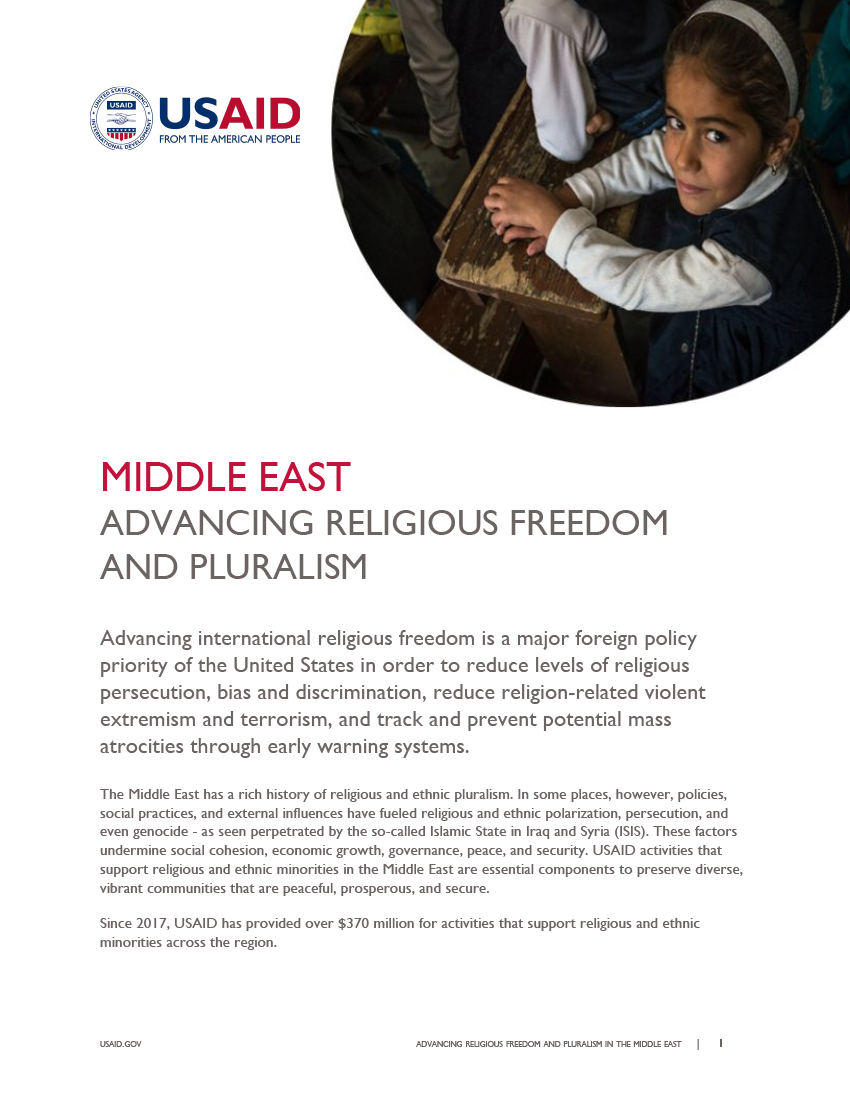Speeches Shim
Advancing international religious freedom is a major foreign policy priority of the United States in order to reduce levels of religious persecution, bias and discrimination, reduce religion-related violent extremism and terrorism, and track and prevent potential mass atrocities through early warning systems.
The Middle East has a rich history of religious and ethnic pluralism. In some places, however, policies, social practices, and external influences have fueled religious and ethnic polarization, persecution, and even genocide - as seen perpetrated by the so-called Islamic State in Iraq and Syria (ISIS). These factors undermine social cohesion, economic growth, governance, peace, and security. USAID activities that support religious and ethnic minorities in the Middle East are essential components to preserve diverse, vibrant communities that are peaceful, prosperous, and secure.
Since 2017, USAID has provided over $370 million for activities that support religious and ethnic minorities across the region.
REGIONAL DEVELOPMENT ACTIVITIES
USAID supports religious and ethnic minority communities across the Middle East, including in Iraq, Lebanon, Libya, and Morocco, as well as regional efforts. USAID has programmed $50 million for activities that support religious and ethnic minorities through workforce development, civil society capacity building, cultural heritage preservation, peaceful dialogue skills, and vulnerability and needs assessments.
Regionally, USAID is conducting assessments and pilot interventions to identify at-risk communities and areas where access to basic services - such as education and health care - are limited, inequitable, or biased for religious and ethnic minorities. These results will help inform future USAID programming.
SUPPORTING GENOCIDE RECOVERY AND PLURALISM IN IRAQ
The United States is committed to promoting pluralism and tolerance in the wake of a genocidal campaign by the Islamic State in Iraq and Syria (ISIS). USAID is funding activities to help persecuted ethnic and religious minorities heal and restore their communities, support economic recovery, and prevent future atrocities. This assistance combines short-, medium-, and long-term efforts that help meet the immediate, life-saving, and recovery needs of these populations; restore access to essential services; rehabilitate critical infrastructure; improve access to jobs; support local businesses; and mobilize local and national actors to prevent future atrocities.
PROMOTING ECONOMIC RECOVERY
USAID is also funding economic security and strengthening the economy of northern Iraq to serve as an engine of recovery for the region. USAID activities are helping the young people of persecuted ethnic and religious minority populations obtain dignified employment by providing vocational training and fostering leadership skills to help them find jobs or start their own businesses. USAID is also improving the competitiveness of small and medium-sized businesses to improve revenues, create jobs, and bring economic prosperity. Finally, USAID is financing rehabilitation and recovery efforts in Mosul to help the city re-emerge as the economic and educational hub it once was.
NEW PARTNERSHIPS INITIATIVE
USAID has awarded over $4 million to six local groups in northern Iraq to help persecuted minorities targeted by violence. By working with new or underutilized partners in northern Iraq through the New Partnerships Initiative (NPI), USAID hopes to bring more innovative approaches to U.S. foreign assistance; focus on strengthening capacity and commitment by tapping into existing networks of community- and faith-based organizations; and reach new populations.
These awards support a variety of local needs, including: job skills training; solar power installation; local organization capacity building; trauma-rehabilitation, resilience, and judicial services to survivors of genocide; and establishing a community center.


Comment
Make a general inquiry or suggest an improvement.